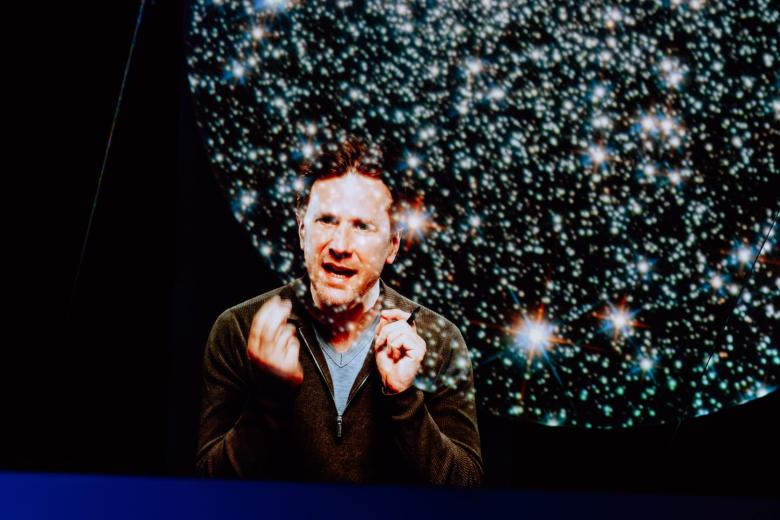Conference on causal data science brings together academics and industry experts
‘Correlation does not imply causation’ is a famous phrase, not only known within the academic ivory tower but also increasingly noticed in the data science departments of large corporations.
On 11 and 12 November, the Maastricht University School of Business and Economics and Copenhagen Business School hosted the Causal Data Science Meeting. The conference was organised by Jermain Kaminski, Carla Schmitt and Beyers Louw from the Organisation, Strategy and Entrepreneurship department at the School of Business and Economics, together with Paul Hünermund from the Department of Strategy and Innovation at Copenhagen Business School.
Over 900 participants from academia and industry
The two-day conference brought together academics and industry experts who work on one of the most fundamental questions in data science: discerning cause and effect from mere correlation. There were 950 registered participants and the program included 26 speakers from academic institutions such as Harvard, MIT, Stanford, Chicago and UCLA, as well as industry labs such as from Microsoft Research, Total, Zalando, and the Google Chief Economics Team. In addition to the speakers, the event welcomed further external attendees from corporations around the world including companies such as Amazon, Apple, Booking.com, DeepMind, ING, Netflix, Novartis, and Spotify, just as several smaller startups in the field of machine learning. The list of attendees featured many software and technology companies, as their products and services highly depend on experimentation for better customer experiences and business outcomes.
‘Hands down, the conference showed the great potential of virtual conferencing. Given that it was the first time we organised this event, we didn’t expect such a great line-up of speakers and large number of attendees. But it tells us that there’s definitely a high demand for causal data science in the business field.’ – Paul Hünermund
Keynote presentations
Carla Schmitt, PhD student at the Department for Organisation, Strategy and Entrepreneurship, introduced the first keynote speaker, Sean Taylor, with a quote from famous HBR innovation scholar Clayton Christensen: ‘Correlation does not reveal the one thing that matters most in innovation – the causality behind why I might purchase a particular solution.’
Sean, who is head of the Rideshare Labs at Lyft, presented about the causal inferences challenges that are central to the business model, emphasising the importance of causal inference in the ridesharing industry and how economic incentives can improve both drivers’ and passengers’ experiences.
The second keynote was by Elias Bareinboim, associate professor in the Department of Computer Science and the director of the Causal Artificial Intelligence Lab at Columbia University. Elias presented about how causal data science solves long-standing challenges in empirical studies that include confounding bias, selection bias, measurement error and generalizability of experimental data. Barenboim underlined that most statistical analysis across different data sources still tends towards comparing apples with oranges, if the data generation process is not correctly taken into account.
Connecting science and industry
‘In the last few months, we noticed that we lack a bridge between research and practice when it comes to causal inference. And so we thought: why don't we just create this bridge ourselves?’ – Jermain Kaminski
One theme throughout the conference was clear: There is an interest from both academia and industry to collaborate and establish a productive dialogue on causal inference, which renders the Causal Data Science Meeting all the more valuable. It created a middle ground for researchers that aim to push basic research and data scientists that aim to ask causal questions about their decision-making strategies. In light of this, there is still a great need to expand causal thinking in industry, that is why the conference also included talks about causal inference tools that were built by either individuals or companies that are open-source and available for anyone to use in their research and data science toolkits.
‘This is exactly why I decided to pursue a PhD, to help firms ask better questions and bridge the gap between academia and industry. Causal Inference is one of the most fundamental aspects of research and the starting point for higher reasoning. This conference provided the platform to enable that and I am looking forward to the potential of this platform in the future.’ – Beyers Louw
The organising committee would like to thank Maastricht University and Copenhagen Business School for funding and support as well as the speakers and attendees for turning the first installment of the Causal Data Science Meeting into such a great success.
Contact the organising team if you have any questions or visit the website for more information: https://causalscience.org/

Also read
-
In Kerkrade, you can listen to the invisible universe
UM and Discovery Museum in Kerkrade make the Einstein Telescope understandable for everyone.

-
As a teacher, how confident are you in your digital skills? Discover your capabilities in just 25 minutes
Maastricht University invites all teaching staff to take part in the Jisc Discovery Tool pilot to explore your digital strengths.

-
More than a student job: five alumni about their unique role in groundbreaking vascular research
What is it like to take part in cutting-edge vascular research as a student, standing in the operating room, directly responsible for handling patient material? Five alumni of the Maastricht MAPEX student team share what they learned, the challenges they faced, and how this experience shaped their...
